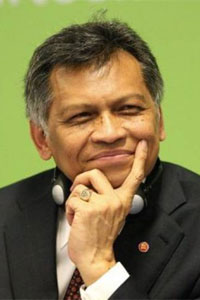As the number of Rohingya Muslims fleeing violence in Myanmar's Rakhine state continues to rise, the Association of Southeast Asian Nations (Asean) remains at a loss as to how to help "douse the fire of communal strife".
The deteriorating situation in the northwestern state bordering Bangladesh has affected not only Myanmar's impoverished Rohingya residents but also Rakhine Buddhists and Hindus who have fled arson and attacks.
Since violence erupted on Aug 25, when Rohingya militants attacked dozens of police outposts and an army base, United Nations workers have estimated that 123,600 Rohingya people have crossed the border into Bangladesh to seek refuge. At least 11,000 Rakhine Buddhists and Hindus have reportedly fled to camps inside Myanmar. The clashes have killed at least 400 people.
In the wake of the humanitarian crisis, Asean risks losing credibility and international confidence if the regional grouping continues to ignore the plight of the Rohingya. The regional grouping needs to act urgently to prevent the Rakhine crisis from spiralling into regional tensions.
As a 10-member inter-governmental body, Asean prides itself on having survived many regional crises and emergency situations, becoming "a community of sharing and caring societies".
However, the Rakhine communal crisis is a new challenge in which Asean's credibility is being put to test.
Asean has taken a role in containing a number of regional conflicts. In the early and late 1990s the regional organisation helped tackle conflicts in Cambodia and engaged in international efforts to restore law and order in East Timor. In early and late 2000s, Asean helped contain escalating conflicts in Aceh, Indonesia and border tensions between two of its member states, Cambodia and Thailand.
Even though those collective efforts were conducted with quiet diplomacy and collective political will, they helped contain the conflicts from escalating further.
When Myanmar was hit by Cyclone Nargis in 2008, Asean proved it could take a regional leadership role in arranging a humanitarian response to the devastation caused by the disaster.
From 2008 to 2010, during which I spearheaded Asean's humanitarian efforts, the regional grouping, with the support of the United Nations, the World Bank and the international community, was able to organise international humanitarian assistance to victims of Cyclone Nargis at a time when Myanmar was still under sanctions by many countries.
The current prevailing and deteriorating situation in Rakhine, which the UN secretary-general describes as a possible "human catastrophe", is another test for Asean's "solidarity, efficacy and credibility."
The personal diplomacy of Indonesia's Foreign Minister Retno Marsudi, who met Myanmar's army chief Snr Gen Min Aung Hlaing in Nay Pyi Taw on Monday, is commendable.
However, she will need the collective support of her Asean ministerial colleagues to help contain this explosive ethnic strife from spiralling into a regional conflict along the cultural divide.
Asean has enough collective diplomatic skills to steer clear of any dreadful accusations of "interference" in a member country's domestic affairs. This is because the grouping has done it before.
What Asean needs in this critical juncture, facing the Rakhine human catastrophe, is a collective sense of urgency and effective leadership. It has to be seen as a serious destabilising factor for the entire regional landscape.
Imagine the cultural divide that could occur within the Asean community. Think of what could happen to the security of the Malacca Straits if extremist ideology takes hold along the Bangladeshi-Myanmar border.
I hope I am wrong, and not an alarmist. But if we are complacent and continue to ignore this evolving crisis, we will have a real human and security catastrophe on our hands.
Asean can act to address the Rakhine crisis. In that event, here is my suggestion: Adopt the modality of its engagement in the East Timorese 1999 crisis.
During that time, Thailand was the Asean chair. Some Asean member countries were not willing to engage in an international effort to bring about peace and security to East Timor during which anti-independence militants' attacks on civilians turned into violence throughout the country.
But then Thai prime minister Chuan Leekpai, as Asean chair, suggested these words which helped break the deadlock: "Those Asean member states which are prepared and willing can join the International Force for East Timor (Interfet)."
He was referring to a multinational task force organised by Australia to address the humanitarian and security crisis in the country from 1999-2000 prior to the arrival of the United Nations peacekeeping force, the UN Transitional Authority for East Timor.
After Mr Chuan's remark, Asean engagement in East Timor became "a coalition of the willing", helping the regional grouping avoid having to gain the consensus required for its decision-making principles.
Asean must now act again to address the Rakhine crisis. It will have to act fast to save lives and prevent the carnage from deteriorating and escalating into regional tensions.
The world is watching. Asean's credibility and profile are hanging in the balance.
Surin Pitsuwan is former secretary-general of Asean and former foreign minister of Thailand.
